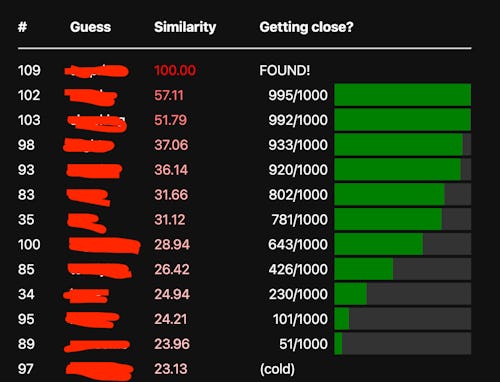
There are a lot of heavenly bodies in the Wordle universe, but the recently discovered Semantle is its black hole — a location situated within the internet’s space-time that draws you in, consumes your mental faculties, and crushes your spirit into an infinitesimal point of desperation.
In short: It’s basically the Elden Ring of word logic games — Wordle on God Level Difficulty setting — and both addictive and fascinating in a way its progenitor can’t match. Trust me: You are not prepared for what lies ahead of you.
Abandon all hope, ye who enter answers here.

Breaking it down as best I can —
My attempt at the simplest explanation is this: Semantle is a game about (you guessed it) semantics. Instead of individual phonetic possibilities, its conceit lies in associations of both idea and grammar powered by a recent natural language processing (NLP) breakthrough called Word2Vec. The entire program itself utilizes “word embeddings,” which is far too complex for me to explain, so here’s a bit from this guy:
Word embeddings is a technique where individual words are transformed into a numerical representation of the word (a vector). Where each word is mapped to one vector, this vector is then learned in a way which resembles a neural network. The vectors try to capture various characteristics of that word with regard to the overall text. These characteristics can include the semantic relationship of the word, definitions, context, etc. With these numerical representations, you can do many things like identify similarity or dissimilarity between words.
Semantle was created by David “novalis” Turner, whose CV currently lists him as a senior software engineer at Twitter. According to the game’s FAQ (which is all but required reading before starting the game), Turner threw a random list of the 5,000 “most popular” words in English — minus capitalized, hyphenated, or “stopwords” like “but” and “if” — into Word2Vec with word embeddings derived from a dataset of Google News stories. From there, players pick a word, and get to associating.
Splitting hairs/lines/spaghetti/dinner —
What’s so fascinating about Semantle is the dual logic on display from both human players and the game’s machine learned interpretation of language. I’ve only just started playing, and already I’m seeing a few very strange logical ties.
(Spoilers for today’s answer below)
For example: Today’s ranking of my 109 guesses from the winning word (“surprise”) to its least related inputs saw attempts like “electrifying” and “frightful” ranked below “huge,” “big,” and “horror.” To some (and the game itself) that makes sense, but to other players that may seem illogical. But that’s part of the beauty of this whole project, isn’t it?
Wordle is dead, as far as I’m concerned. Leave it behind the New York Time’s paywall. Something like Semantle feels more ingenious, pure, and because of its ridiculous complexity, unlikely to become defiled by the highest corporate bidder anytime soon...
Soon. Imminent. Near. Aside. Detour. Rabbit hole.







